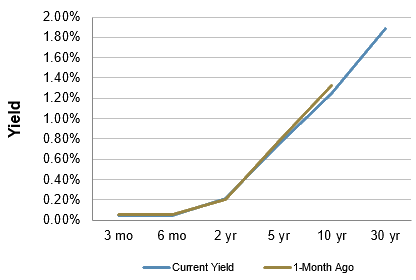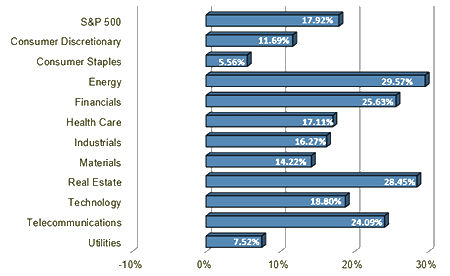Chief Economist Scott Brown discusses the latest market data.
Nonfarm payrolls rose by 943,000 in the initial estimate for July (-133,000 before seasonal adjustment), following a 938,000 gain in June, boosted partly by a seasonal quirk in education (less hiring at the start of the school year resulted in fewer seasonal layoffs in June and July). Ex-education, payrolls rose by 672,000, following a 668,000 gain in June, with an ongoing recovery (+380,000) in leisure and hospitality. The unemployment rate fell to 5.4% (from 5.9%), with the rate for prime-age workers (25-54) down to 4.9% (from 5.5% in June). In contrast to the strength in the Bureau of Labor Statistics data, the ADP estimate of private-sector payrolls slowed to a 330,000 gain in July.
The ISM Manufacturing Index edged down to 59.5 in July, vs. 60.6 in June. The ISM Services Index rose to 64.1, vs. 60.1. Both surveys showed ongoing supply chain issues, input cost pressures and hiring difficulties. The trade deficit widened to a record $75.7 billion in June, reflecting further strength in imports. Unit motor vehicle sales fell to a 14.8 million seasonally adjusted annual rate in July (vs. 15.4 million in June), down 19.4% in the last three months.
Next week: The focus will likely be on the Consumer Price Index (CPI). Higher gasoline prices should add to the CPI in July. Core inflation ought to be more moderate than in recent months. Base effects (the rebound from low inflation a year ago) have begun to fade. (The CPI rose 1.0% in the 12 months ending July 2020, core up 1.6%.) Bottleneck pressures are still with us. Used motor vehicle prices appear to have turned the corner after rising sharply (+30.4%) over the previous three months. Anecdotal info suggests a mixed ability for firms to pass higher costs along.
Indices
| Last | Last Week | YTD return % | |
|---|---|---|---|
| DJIA | 34,792.67 | 35,084.53 | 14.56% |
| NASDAQ | 14,780.53 | 14,778.26 | 15.57% |
| S&P 500 | 4,402.66 | 4,419.15 | 17.92% |
| MSCI EAFE | 2,358.52 | 2,341.81 | 9.83% |
| Russell 2000 | 2,196.32 | 2,240.81 | 13.22% |
Consumer Money Rates
| Last | 1 year ago | |
|---|---|---|
| Prime Rate | 3.25 | 3.25 |
| Fed Funds | 0.08 | 0.08 |
| 30-year mortgage | 2.85 | 2.82 |
Currencies
| Last | 1 year ago | |
|---|---|---|
| Dollars per British Pound | 1.3931 | 1.314 |
| Dollars per Euro | 1.1834 | 1.188 |
| Japanese Yen per Dollar | 109.77 | 105.55 |
| Canadian Dollars per Dollar | 1.251 | 1.331 |
| Mexican Peso per Dollar | 19.934 | 22.399 |
Commodities
| Last | 1 year ago | |
|---|---|---|
| Crude Oil | 69.09 | 41.95 |
| Gold | 1808.90 | 2069.40 |
Bond Rates
| Last | 1 month ago | |
|---|---|---|
| 2-year treasury | 0.21 | 0.20 |
| 10-year treasury | 1.25 | 1.33 |
| 10-year municipal (TEY) | 1.292 | 1.338 |
Treasury Yield Curve – 08/06/2021

As of close of business 08/05/2021
S&P Sector Performance (YTD) – 08/06/2021

Economic Calendar
| August 11 | — | Consumer Price Index (July) |
| August 17 | — | Retail Sales (July) |
| August 3 | — | Employment Report (August) |
| September 6 | — | Labor Day Holiday (markets closed) |
| September 22 | — | FOMC Policy Decision |
All expressions of opinion reflect the judgment of the author and are subject to change. There is no assurance any of the forecasts mentioned will occur or that any trends mentioned will continue in the future. Investing involves risks including the possible loss of capital. Past performance is not a guarantee of future results. International investing is subject to additional risks such as currency fluctuations, different financial accounting standards by country, and possible political and economic risks, which may be greater in emerging markets. While interest on municipal bonds is generally exempt from federal income tax, it may be subject to the federal alternative minimum tax, and state or local taxes. In addition, certain municipal bonds (such as Build America Bonds) are issued without a federal tax exemption, which subjects the related interest income to federal income tax. Municipal bonds may be subject to capital gains taxes if sold or redeemed at a profit. Taxable Equivalent Yield (TEY) assumes a 35% tax rate.
The Dow Jones Industrial Average is an unmanaged index of 30 widely held stocks. The NASDAQ Composite Index is an unmanaged index of all common stocks listed on the NASDAQ National Stock Market. The S&P 500 is an unmanaged index of 500 widely held stocks. The MSCI EAFE (Europe, Australia, Far East) index is an unmanaged index that is generally considered representative of the international stock market. The Russell 2000 index is an unmanaged index of small cap securities which generally involve greater risks. An investment cannot be made directly in these indexes. The performance noted does not include fees or charges, which would reduce an investor’s returns. U.S. government bonds and treasury bills are guaranteed by the US government and, if held to maturity, offer a fixed rate of return and guaranteed principal value. U.S. government bonds are issued and guaranteed as to the timely payment of principal and interest by the federal government. Treasury bills are certificates reflecting short-term (less than one year) obligations of the U.S. government.
Commodities trading is generally considered speculative because of the significant potential for investment loss. Markets for commodities are likely to be volatile and there may be sharp price fluctuations even during periods when prices overall are rising. Specific sector investing can be subject to different and greater risks than more diversified investments. Gross Domestic Product (GDP) is the annual total market value of all final goods and services produced domestically by the U.S. The federal funds rate (“Fed Funds”) is the interest rate at which banks and credit unions lend reserve balances to other depository institutions overnight. The prime rate is the underlying index for most credit cards, home equity loans and lines of credit, auto loans, and personal loans. Material prepared by Raymond James for use by financial advisors. Data source: Bloomberg, as of close of business August 5, 2021.
Markets & Investing Members of the Raymond James Investment Strategy Committee share their views on...
Markets & Investing Review the latest Weekly Headings by CIO Larry Adam. Key Takeaways ...
Technology & Innovation Learn about a few simple things you can do to protect your personal information...